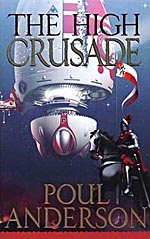
![]() couchtomoon
couchtomoon
2/22/2014
![]()
When a spaceship lands in the English shire of Ansby during the middle of the Hundred Years' War, Sir Roger, Baron de Tournville, leads his knights to battle against strange blue "demons," then hijacks their ship to mount an attack against France. But the lone alien survivor of the Wesgorix, kept alive for information, misleads his captors and autopilots a return to his home empire. Do the merry English bat an eye? Hardly! The sprawling interstellar empire of the Wesgorix is simply another territory for the Crusade-happy Baron to claim in the name of King Edward III and Christendom.
Monty Python meets Hitchhiker's Guide? Why not? While the marrying of medieval romps and galactic pioneering sounds as fun today as it did over fifty years ago, the execution is sparse for modern SFers whose mash-up expectations require hundreds of pages, years of research, valid science, and ironic nihilism. But when the first tenth of a novel is dedicated to its most famous fans' love letters, you know you've stumbled on to an important piece of SF history.
The humor is the axle of this tale, not necessarily in punchline form (although that is sometimes the case), but always present in the sheer zaniness of such a premise. Medieval knights in space? Horses, cattle, and wenches striding down the ramp of a rocket? Christian-converted blue aliens? A medieval siege against a high-tech alien fortress? It's ludicrous, implausible, and downright farcical, but that's the charm of the novel. The knights themselves are oh, so serious about their duty to the Crusade. When communication fails with the captive blue alien, the Baron shouts at his mousy cleric, "Nonsense! All demons know Latin, at least. He's just being stubborn."
Although the silliness nullifies any high, historic-fantasy potential (and renders impotent social commentary), some character-driven drama exists, primarily in a Lancelot-inspired love triangle, and certain ethical gray areas arise: Should Sir Roger risk the unknown stars to return his people home, or continue this interstellar Crusade for England, God, and glory? But those dramatic moments are mere glimpses that surface between the crests of this zany premise. This is no Once and Future King or Mists of Avalon, the interpersonal conflicts serve as equal fodder for the lampoon, although this novel did inspire Anderson's friends to start the medieval faires that still attract today's chivalry-seeking crowds.
Despite the novel's supportive fan base, I found the novel wanting. The humor, delivered through the memoirs of the Baron's timid cleric, Brother Parvus, becomes redundant, never maturing beyond its innocent nature. The punchline is always the same: these silly Englishmen are low-tech and naive, yet their arrogant bravado wins the day! Moreover, the romp fell short of its rollicking promise. The struggles are too easy to overcome. Nuclear bombs can't even defeat the English, but aliens who have mastered sky and space choose to engage in clumsy ground warfare! The only real anticipation comes from Brother Parvus' misleading portents of serious woe, which never come to fruition. That's a dirty trick, Anderson, and I'm still a little pissed about that.
Perhaps The High Crusade is not challenging or complex enough for the adult palate, but this novel might be best enjoyed as a children's bedtime story. The shallow conflicts and easy successes would be appreciated by a younger mind, which could find pleasure in feeling smarter than the characters. The stakes aren't critical enough to scare the youngest of children, the less-than-subtle ethical dilemmas would make ideal teaching moments for critical thinking and, although an adult might struggle with the many implausibilities, the valiant successes of these knights-errant echo comic-book style heroics. Adult me was bored, but I can't help thinking that a younger me would have adored this book. Click the link below to see my full review!
http://couchtomoon.wordpress.com/2014/02/22/one-to-read-with-the-kiddos-the-high-crusade-1960-by-pou